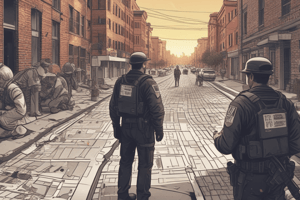Podcast
Questions and Answers
Two types of Probable Cause: _____________ and ______________
Two types of Probable Cause: _____________ and ______________
- Search and Seizure
- Arrest and Search (correct)
- Reasonable and Mere
- 1st and 2nd
Probable cause to arrest
Probable cause to arrest
- exists when “the facts and circumstances within their [the officers’] knowledge and of which they had reasonably trustworthy information [are] sufficient in themselves to warrant a man of reasonable caution in the belief that [seizable property would be found in a particular place or on a particular person]
- exists where the facts and circumstances within the officer’s knowledge, and of which they have reasonable trustworthy information, are sufficient in themselves to warrant a belief by a man of reasonable caution that a crime is being committed. (correct)
- A hunch or the feeling of intuition.
- None
Probable Cause to Search
Probable Cause to Search
- Exists where the facts and circumstances within the officer’s knowledge, and of which they have reasonable trustworthy information, are sufficient in themselves to warrant a belief by a man of reasonable caution that a crime is being committed.
- A hunch or the feeling of intuition.
- Good faith effort
- Exists when “the facts and circumstances within their [the officers’] knowledge and of which they had reasonably trustworthy information [are] sufficient in themselves to warrant a man of reasonable caution in the belief that [seizable property would be found in a particular place or on a particular person] (correct)
Carroll Doctrine = _______________
Carroll Doctrine = _______________
The court held that while the police need not always be factually correct in conducting a warrantless search, such a search must always be reasonable.
The court held that while the police need not always be factually correct in conducting a warrantless search, such a search must always be reasonable.
The Court held that the circumstances warranted the determination that the defendant had been found in a suspicious place under circumstances that reasonably showed that he was guilty of driving while intoxicated, a breach of the peace.
The Court held that the circumstances warranted the determination that the defendant had been found in a suspicious place under circumstances that reasonably showed that he was guilty of driving while intoxicated, a breach of the peace.
Supreme Court that upheld the warrantless searches of an automobile, which is known as the automobile exception. The case has also been cited as widening the scope of search.
Supreme Court that upheld the warrantless searches of an automobile, which is known as the automobile exception. The case has also been cited as widening the scope of search.
Supreme Court that upheld the warrantless searches of an automobile, which is known as the automobile exception. The case has also been cited as widening the scope of search.
Supreme Court that upheld the warrantless searches of an automobile, which is known as the automobile exception. The case has also been cited as widening the scope of search.
The Court upheld the search and reasoned that the agents had a reasonable suspicion that respondent was engaged in wrongdoing.
The Court upheld the search and reasoned that the agents had a reasonable suspicion that respondent was engaged in wrongdoing.
The United States Supreme Court held that consent was involuntary because the defendant was being illegally detained when he consented to the search of his luggage.
The United States Supreme Court held that consent was involuntary because the defendant was being illegally detained when he consented to the search of his luggage.
Court ruled that it is constitutional for American police to "stop and frisk" a person they reasonably suspect to be armed and involved in a crime. Reasonably suspects the person has or is about to commit a crime.
Court ruled that it is constitutional for American police to "stop and frisk" a person they reasonably suspect to be armed and involved in a crime. Reasonably suspects the person has or is about to commit a crime.
The court determined that "seizure" occurs when an officer uses physical force or displays authority to detain a person.
The court determined that "seizure" occurs when an officer uses physical force or displays authority to detain a person.
Prohibits the police from making a warrantless and nonconsensual entry into a suspect's home in order to make a routine felony arrest.
Prohibits the police from making a warrantless and nonconsensual entry into a suspect's home in order to make a routine felony arrest.
The Court concluded that the informant's recitation of detailed facts, though relating to innocent activities, when corroborated by observation by police officers, afforded probable cause to believe that respondents had drugs in their possession; therefore, the evidence obtained should not be suppressed.
The Court concluded that the informant's recitation of detailed facts, though relating to innocent activities, when corroborated by observation by police officers, afforded probable cause to believe that respondents had drugs in their possession; therefore, the evidence obtained should not be suppressed.
Ruled that an arrested individual is entitled to rights against self-incrimination and to an attorney under the 5th and 6th Amendments of the United States Constitution.
Ruled that an arrested individual is entitled to rights against self-incrimination and to an attorney under the 5th and 6th Amendments of the United States Constitution.
The Court held that police may re-open questioning of a suspect who has asked for counsel (thereby under Edwards v. Arizona ending questioning) if there has been a 14-day or more break in Miranda custody.
The Court held that police may re-open questioning of a suspect who has asked for counsel (thereby under Edwards v. Arizona ending questioning) if there has been a 14-day or more break in Miranda custody.
Statements made in custodial interrogation are admissible in court if the suspect has been warned of rights and statement is made voluntarily -inadmissible only if the warning were misstated when they were given prior to interrogation
Statements made in custodial interrogation are admissible in court if the suspect has been warned of rights and statement is made voluntarily -inadmissible only if the warning were misstated when they were given prior to interrogation
Based on the Fourth Amendment, a police officer may not conduct a warrantless search of a third party's home in an attempt to apprehend the subject of an arrest warrant, absent consent or exigent circumstances.
Based on the Fourth Amendment, a police officer may not conduct a warrantless search of a third party's home in an attempt to apprehend the subject of an arrest warrant, absent consent or exigent circumstances.
The court ruled officer's warrantless entry into the home was justified under the emergency aid exception to getting a warrant because their entry was plainly reasonable under the circumstances.
The court ruled officer's warrantless entry into the home was justified under the emergency aid exception to getting a warrant because their entry was plainly reasonable under the circumstances.
Court held warrantless searches conducted in police created exigent circumstances do not violate the 4th Amendment. The "hot pursuit" exception.
Court held warrantless searches conducted in police created exigent circumstances do not violate the 4th Amendment. The "hot pursuit" exception.
The high court said evidence seized unlawfully, without a search warrant, could not be used in criminal prosecutions in state courts.
The high court said evidence seized unlawfully, without a search warrant, could not be used in criminal prosecutions in state courts.
The high court said evidence seized unlawfully, without a search warrant, could not be used in criminal prosecutions in state courts.
The high court said evidence seized unlawfully, without a search warrant, could not be used in criminal prosecutions in state courts.
Court held that the seizure of items from a residence directly violated their constitutional rights. The Court also held that the government's refusal to return the possessions violated the Fourth Amendment.
Court held that the seizure of items from a residence directly violated their constitutional rights. The Court also held that the government's refusal to return the possessions violated the Fourth Amendment.
The evidence pertaining to the discovery and condition of the victim's body was properly admitted at respondent's second trial on the ground that it would ultimately or inevitably have been discovered even if no violation of any constitutional provision had taken place.
The evidence pertaining to the discovery and condition of the victim's body was properly admitted at respondent's second trial on the ground that it would ultimately or inevitably have been discovered even if no violation of any constitutional provision had taken place.
Supreme Court held that police officers are only entitled to qualified immunity in civil suits concerning the issuance of an unconstitutional arrest warrant and the standard of review in such cases is to be the objective reasonableness test.
Supreme Court held that police officers are only entitled to qualified immunity in civil suits concerning the issuance of an unconstitutional arrest warrant and the standard of review in such cases is to be the objective reasonableness test.
The court held that an out-of-court declaration made after an arrest may not be used at the trial against one of the declarant's partners in a crime unless the statement was made in furtherance of the criminal undertaking. Expounding, the Court posited that the arrests were held without probable cause.
The court held that an out-of-court declaration made after an arrest may not be used at the trial against one of the declarant's partners in a crime unless the statement was made in furtherance of the criminal undertaking. Expounding, the Court posited that the arrests were held without probable cause.
Probable cause exists where the facts and circumstances within tie officer's knowledge and of which he has reasonably trustworthy information are sufficient in themselves to warrant a man of reasonable caution in the belief that a particular person has committed or is committing an offense.
Probable cause exists where the facts and circumstances within tie officer's knowledge and of which he has reasonably trustworthy information are sufficient in themselves to warrant a man of reasonable caution in the belief that a particular person has committed or is committing an offense.
Supreme Court decision clarifying the reasonable suspicion standard for the investigative stop of a vehicle. The objective facts and circumstantial evidence justified the investigative stop of respondents' vehicle.
Supreme Court decision clarifying the reasonable suspicion standard for the investigative stop of a vehicle. The objective facts and circumstantial evidence justified the investigative stop of respondents' vehicle.
the Court determined that the defendant's arrest in El Paso, Texas, for a refusal to identify himself, after being seen and questioned in a high crime area, was not based on a reasonable suspicion of wrongdoing and thus violated the Fourth Amendment
the Court determined that the defendant's arrest in El Paso, Texas, for a refusal to identify himself, after being seen and questioned in a high crime area, was not based on a reasonable suspicion of wrongdoing and thus violated the Fourth Amendment
An officer is permitted to conduct a vehicle search when an arrestee is within reaching distance of the vehicle or it is reasonable to believe the vehicle contains evidence of the offense of arrest.
An officer is permitted to conduct a vehicle search when an arrestee is within reaching distance of the vehicle or it is reasonable to believe the vehicle contains evidence of the offense of arrest.
Flashcards are hidden until you start studying




